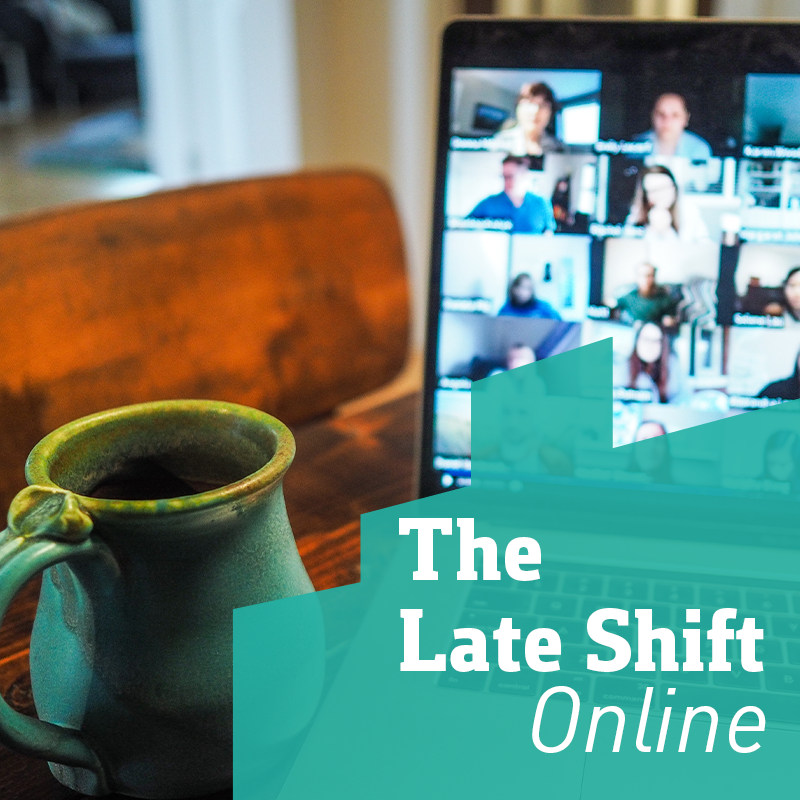Tune in for the virtual program
www.facebook.com/torpedofactory
Join us from the comfort of your own home for an online celebration of new exhibitions, artists, and ideas.
Travel through history with Melanie Kehoss’s Through the Kitchen Door, on view now in the New Project Studio, and experience a follow-up live conversation with the artist.
We host an in-depth panel discussion with the two summer 2020 Post Grad artists, Ashley Llanes and Luis A. Navas-Reyes.
Schedule of Activities
7:00 – 7:02 pm: Introduction
7:03 – 7:25 pm: Live Conversation: Melanie Kehoss: Through the Kitchen Door
If you have questions for Melanie about her installation in the New Project Studio, send them to [email protected] for consideration and you may hear them answered live.
7:30 – 7:45 pm: Post Grad Artist Presentation: Ashley Llanes
7:45 – 8:00 pm: Post Grad Artist Presentation: Luis A. Navas-Reyes
8:00 – 8:25 pm: Featured Late Shift Talk: Post Grad Artists Roundtable Discussion with Leslie Mounaime, Torpedo Factory Art Center’s curator of exhibitions
8:25 – 8:30 pm: Closing Remarks
About the Post Grad Artists
Ashley Llanes is a queer identifying artist who makes personally political work about her Cuban American identity, her affinity for Miami’s culture , and her relationship with her upbringing as a Cuban Catholic as well as the strict cultural expectations that come with it. Ashley has a balance of reconciliation and criticism for her religious and traditional upbringing in her work. These topics are demonstrated through photos, collage, zine and bookmaking.
During her residency, Ashley will continue her exploration of materials and focusing on the concept of intergenerational trauma. Ashley describes, ” I would like to use large scale collages to go back through my family history and map out how my trauma relates to that of my ancestors. I have already begun to test these concepts with existing archives, family photos and found objects. A big component in this piece is also the investigation of whether I feel fit to have children, and what my part in contributing to the next generation would look like. With this residency providing a space, I would be able to plan out multiple pieces at a time and be able to produce works on a much larger scale. I think this concept is something that most every human can empathize with.”
Luis A. Navas-Reyes is a visual artist whose work is a translation of abstract compositions that build upon his unique and personal visual vocabulary. His work is rooted in his identity, culture, environments, abstraction, power structures, familiar and historical histories. Utilizing media such as printmaking, drawings, ceramics, and bookmaking Luis explores themes, narratives, and forms. In 2018, Luis was awarded “Jurors Choice” at Artworks juried show. He was also selected to participate in the Dolph Project that contextualized contemporary art practice. Luis completed his BFA at James Madison University in 2018. In 2019, he was awarded a to research in Sevilla, Spain.
During his residency, Luis will be focusing on several projects, the first is called “Burnt Pages”. Luis states, “The goal is for Latino American’s to write down their stories ranging from everyday life to life-changing moments, why? Because in our shared past our stories were burnt, lost and fragmented due to colonialism and nature. But what if I make copies and burn the pages the stories are on? Why would I burn the stories? All Latino Americas are the conquerors and the conquered. We are the traitors but also the resilient. For me to burn my people’s stories is to give them life. Life carries on in the memories of others passing down the feeling they felt when they read those stories. Eventually, all being lost to time again. Cycles very familiar to Latin American history. What do I do with the ashes? Is there a recovery? How do people deal with loss? How do Latino Americans deal with that fragmented history? What’s that histories relationship to contemporary times? This residency would benefit the number of people I reach for this kind of project from everyday people to specific communities.”


